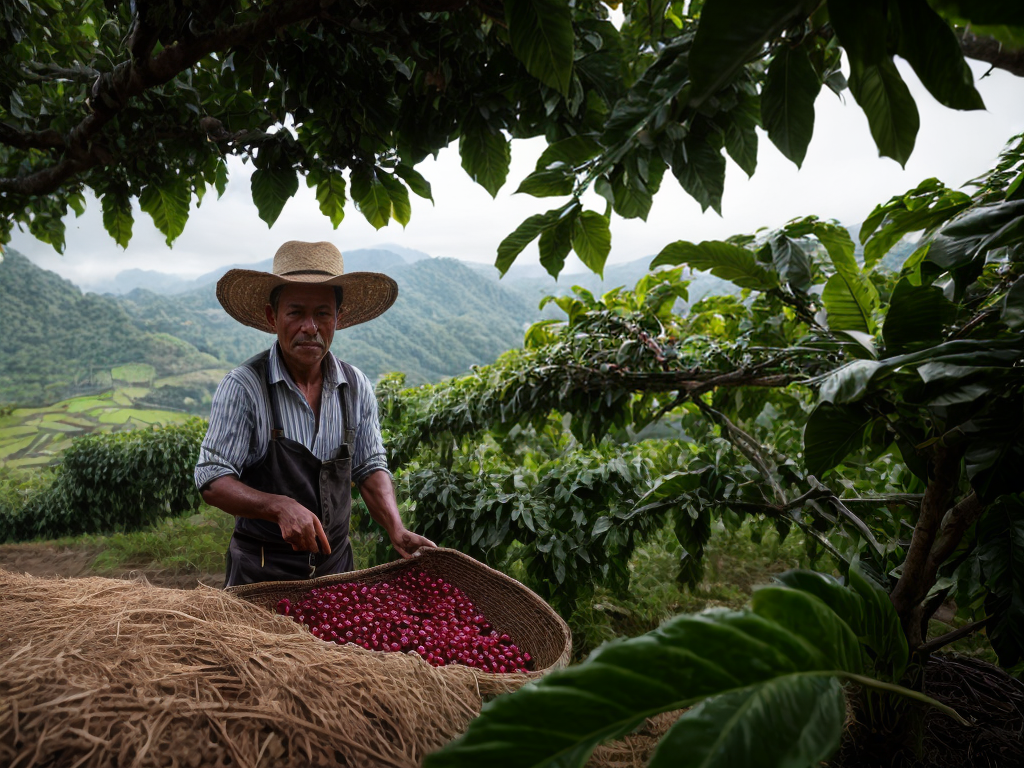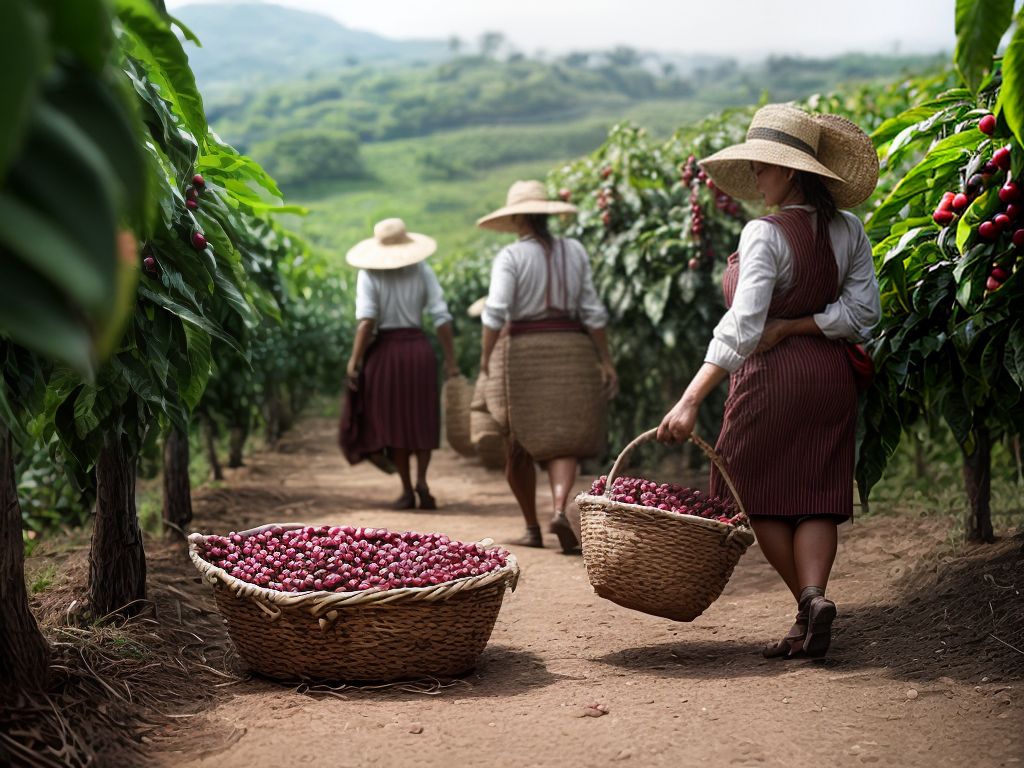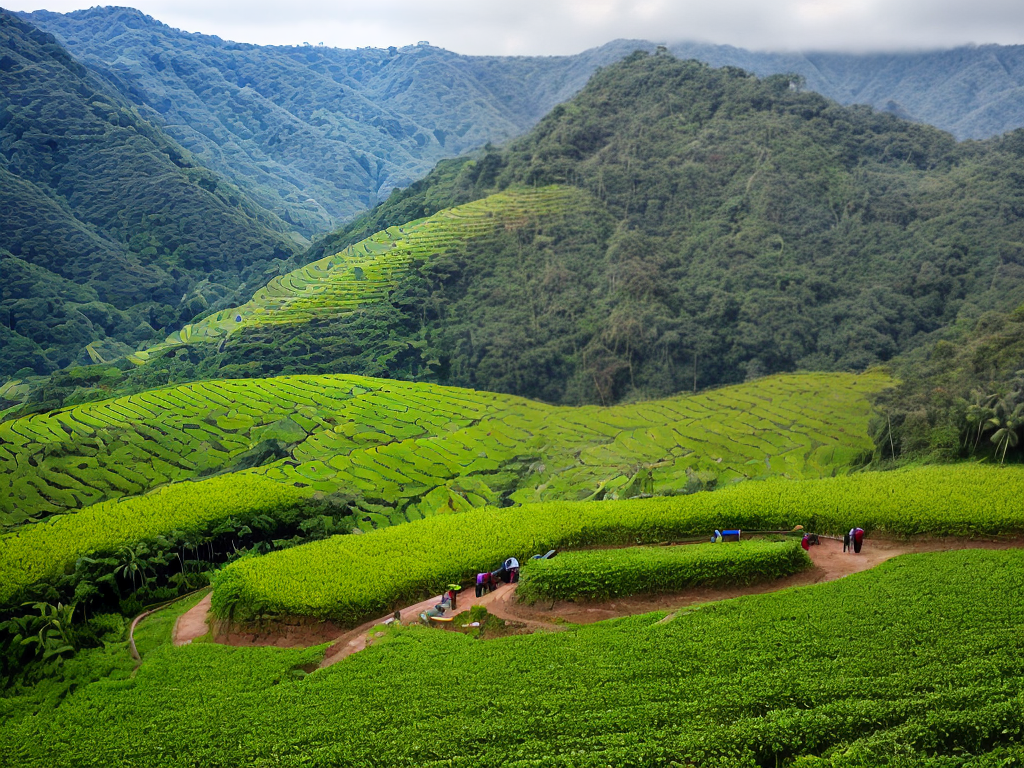
Did you know that coffee is the second most traded commodity in the world after oil? With such a high demand, it becomes crucial to consider the sustainability of sourcing coffee beans. In this discussion, I will shed light on our approach to sustainable sourcing and how we choose our coffee beans. From our commitment to supporting ethical farmers to our focus on traceability and transparency, we strive to make conscious choices that not only benefit the environment but also the communities involved in coffee production. So, let’s explore the fascinating journey of our sustainable coffee sourcing and discover the impact it creates.
Our Commitment to Sustainability
How do we ensure our coffee beans are sustainably sourced? At our company, we are committed to evaluating sustainability and conducting thorough environmental impact assessments for all of our coffee bean suppliers. We understand that our customers desire belonging to a community that values environmental responsibility, and we take this responsibility seriously.
To evaluate sustainability, we have implemented a rigorous process that involves assessing various aspects of our suppliers’ operations. This includes examining their farming practices, such as the use of pesticides and the conservation of water resources. We also consider their waste management strategies and their commitment to biodiversity conservation. By conducting these evaluations, we can ensure that our coffee beans are sourced from suppliers who prioritize sustainability.
In addition to evaluating sustainability, we also conduct comprehensive environmental impact assessments. These assessments help us understand the potential environmental consequences of our suppliers’ activities. We assess factors such as carbon emissions, water usage, and waste generation. By considering these impacts, we can make informed decisions about which suppliers align with our commitment to sustainability.
Our commitment to sustainability goes beyond just evaluating our suppliers. We also actively engage in initiatives that promote sustainable farming practices and support local communities. We work closely with our suppliers to provide them with the resources and knowledge they need to implement sustainable practices. This collaborative approach allows us to make a positive impact on the environment and create a sense of belonging within the communities we operate.
Sourcing From Ethical Farmers
We prioritize sourcing our coffee beans from ethical farmers to ensure the highest quality and sustainable practices. Ethical sourcing is at the core of our commitment to sustainability. We believe that by partnering with farmers who share our values, we can create a positive impact on both the environment and the communities they belong to.
When it comes to ethical sourcing, we go beyond the basic requirements. We actively seek out farmer partnerships that adhere to fair labor practices, promote biodiversity, and prioritize the well-being of their workers. By working closely with these farmers, we ensure that they receive fair wages and have access to training and resources to improve their farming practices.
Through our farmer partnerships, we also support the development of sustainable agricultural techniques. We provide guidance on organic farming methods, such as composting and natural pest control, to minimize the use of harmful chemicals. By promoting these practices, we help farmers reduce their environmental footprint and preserve the health of their land for future generations.
In addition to ethical sourcing, our farmer partnerships enable us to establish long-term relationships built on trust and mutual respect. We visit the farms regularly to maintain open lines of communication and ensure that our shared values are upheld. These relationships allow us to work together towards continuous improvement and innovation in coffee production.
Sourcing from ethical farmers not only guarantees the highest quality beans but also contributes to the betterment of communities and the environment. By supporting these farmers, we are able to create a sustainable supply chain that is socially responsible and environmentally friendly. Together, we can enjoy a cup of coffee knowing that it was sourced with care and consideration for the people and the planet.
Direct Trade Relationships
Our direct trade relationships ensure transparency and accountability in our coffee bean sourcing process. We believe in building strong partnerships with coffee farmers who share our commitment to sustainable farming practices. Through direct trade, we establish long-term relationships with farmers, enabling us to work together towards a common goal of producing high-quality, ethically sourced coffee.
Direct trade allows us to have a direct line of communication with the farmers, ensuring that we have a clear understanding of their farming practices. We visit the farms regularly to assess the conditions and ensure that sustainable farming practices are being followed. This includes promoting organic farming methods, conservation of water resources, and minimizing the use of pesticides and fertilizers. By working closely with the farmers, we can support their efforts to protect the environment and promote biodiversity.
In addition to promoting sustainable farming practices, direct trade also ensures fair compensation for the farmers. We believe in paying a premium price for the coffee beans, which reflects the hard work and dedication of the farmers. This not only helps to improve their livelihoods but also encourages them to continue producing high-quality coffee.
Through our direct trade relationships, we are able to trace the journey of our coffee beans from farm to cup. This transparency allows us to guarantee the quality and integrity of our coffee, giving our customers the assurance that they are supporting a sustainable and responsible coffee industry. By choosing coffee beans sourced through direct trade, you become a part of our global community that values ethical sourcing and sustainable farming practices.
Organic and Fair Trade Certifications
When it comes to choosing coffee beans, two important factors to consider are organic and fair trade certifications. These certifications ensure that the coffee beans were produced using environmentally friendly practices and that the farmers were paid fair wages. By looking for these certifications, consumers can have confidence in the ethical sourcing of their coffee and support sustainable farming practices.
Certification Standards
Certification standards play a crucial role in determining the quality and ethical sourcing of coffee beans, with organic and fair trade certifications being widely recognized and sought after by coffee enthusiasts. These certifications ensure that coffee farmers adhere to specific criteria that promote sustainable practices and protect the environment.
Organic certification requires coffee beans to be grown without the use of synthetic fertilizers, pesticides, or genetically modified organisms. This not only benefits the health of the consumer but also supports the preservation of ecosystems and biodiversity. Fair trade certification, on the other hand, focuses on ensuring fair wages, safe working conditions, and community development for coffee farmers. By purchasing coffee with these certifications, consumers can actively contribute to the well-being of coffee farmers and the sustainability of the coffee industry.
Below is a table summarizing the key differences between organic and fair trade certifications:
| Certification | Criteria | Impact |
|---|---|---|
| Organic | No synthetic chemicals, GMOs, or pesticides | Health, environment, biodiversity |
| Fair Trade | Fair wages, safe working conditions, community | Economic, social, community |
Ethical Sourcing
After understanding the importance of certification standards in promoting sustainable practices and protecting the environment, it is crucial to explore the concept of ethical sourcing through organic and fair trade certifications. Ethical certifications, such as organic and fair trade, go beyond just ensuring the quality of the coffee beans. They also focus on the well-being of the farmers and the communities they belong to. Organic certifications guarantee that the coffee is produced without the use of harmful chemicals, protecting both the environment and the health of the farmers. Fair trade certifications, on the other hand, ensure that farmers are paid fair prices for their products, empowering them economically and socially. By choosing coffee beans with these ethical certifications, we support farmer empowerment and contribute to a more sustainable and equitable coffee industry.
Traceability and Transparency
As a coffee enthusiast, I prioritize traceability and transparency when selecting my coffee beans. It is important to know where my beans come from and how they are sourced. Traceability refers to the ability to track the journey of the coffee beans from the farm to my cup, while transparency ensures that the entire process is visible and open to scrutiny.
When it comes to bean sourcing, traceability allows me to know the origin of the beans, the specific farm or cooperative they come from, and even the individual farmers who grew them. This information helps me make informed choices and support sustainable practices. It also ensures that the beans are ethically sourced, meaning that they were grown and harvested under fair and environmentally friendly conditions.
Transparency, on the other hand, is crucial for understanding the supply chains involved in getting the beans to me. It ensures that there are no hidden or unethical practices along the way. By having access to information about the various stages of production, processing, and transportation, I can be confident that the beans I choose are not only of high quality but also obtained through responsible and sustainable means.
Evaluating Environmental Impact
Understanding the impact of coffee bean sourcing on the environment is essential for making informed choices as a coffee enthusiast. Evaluating sustainability and conducting an environmental impact assessment can help us assess the environmental footprint of the coffee beans we consume. Here are four key factors to consider when evaluating the environmental impact of coffee bean sourcing:
-
Shade-grown coffee: Look for coffee beans that are grown under shade trees. This cultivation method helps conserve biodiversity, provides habitat for birds, and reduces the need for synthetic pesticides. Shade-grown coffee farming also helps to prevent soil erosion and preserve water resources.
-
Certifications: Choose coffee beans that are certified as organic, Fairtrade, or Rainforest Alliance. These certifications ensure that the coffee is produced using sustainable practices, protects the rights of workers, and supports the well-being of local communities.
-
Water usage: Assess the water footprint of coffee cultivation. Opt for coffee beans that are grown using water-efficient irrigation methods and practices that minimize water pollution. Sustainable water management in coffee production helps preserve this vital resource.
-
Carbon footprint: Consider the carbon emissions associated with coffee production and transportation. Look for coffee beans that are sourced locally or from regions with lower carbon footprints. Additionally, support brands that offset their emissions through initiatives like reforestation or renewable energy projects.
Supporting Local Communities
When it comes to choosing coffee beans, supporting local communities is an important aspect to consider. By engaging with the community, coffee companies can have a positive economic impact by creating jobs and supporting local businesses. Ethical partnerships with local farmers also ensure fair wages and sustainable practices, benefiting both the community and the consumer.
Community Engagement
Supporting local communities through active engagement is essential for fostering a thriving coffee culture. Here are four ways we engage with communities to empower and support local entrepreneurship:
-
Collaborating with local farmers: We work closely with coffee farmers, providing them with resources and knowledge to improve their farming practices. By empowering them, we ensure the sustainability of their businesses and the quality of the coffee they produce.
-
Investing in education and training: We believe in equipping individuals with the skills they need to succeed. We offer training programs to coffee growers and local entrepreneurs, enabling them to enhance their knowledge and expertise in the coffee industry.
-
Creating job opportunities: We prioritize hiring locally, promoting economic growth and stability within the community. By providing employment opportunities, we contribute to the development of sustainable livelihoods and support the local economy.
-
Supporting community initiatives: We actively engage in community projects and initiatives that address social and environmental issues. By partnering with local organizations, we strive to make a positive impact and foster a sense of belonging within the community.
Through these community engagement efforts, we aim to empower local communities and contribute to their overall well-being.
Economic Impact
To support local communities, our focus is on creating a positive economic impact through various initiatives. We believe in fostering economic growth and job creation in the regions where we source our coffee beans. By working directly with local farmers and cooperatives, we ensure that they receive fair prices for their products. This not only helps them sustain their livelihoods but also contributes to the overall economic development of their communities. Additionally, we invest in training programs and provide resources to improve farming techniques, productivity, and quality of the coffee beans. By supporting local businesses and promoting sustainable practices, we aim to create a ripple effect of economic benefits that extend beyond just the coffee industry.
Ethical Partnerships
By forging ethical partnerships with local farmers and cooperatives, we continue to make a positive economic impact on the communities where we source our coffee beans. Our commitment to ethical sourcing and responsible farming goes beyond just buying beans. Here are four ways we support and uplift local communities:
-
Fair Trade Practices: We ensure that farmers receive fair compensation for their hard work. By paying fair prices, we enable them to invest in their farms, education, and healthcare.
-
Training and Education: We provide training programs to help farmers improve their agricultural practices, increase crop yields, and protect the environment. This empowers them to achieve sustainable livelihoods.
-
Community Development: We actively engage with local communities, supporting infrastructure projects, healthcare initiatives, and educational programs. We believe in fostering long-term relationships that benefit everyone involved.
-
Empowering Women: We strive for gender equality by actively supporting and empowering women in coffee-growing communities. Through various initiatives, we help them gain access to resources, education, and leadership opportunities.
Through these ethical partnerships, we aim to create a more sustainable and inclusive coffee industry while supporting the well-being of local communities.
Promoting Biodiversity
Promoting biodiversity is crucial for the sustainability of coffee bean production. As a coffee company committed to ethical and sustainable sourcing, we understand the importance of supporting conservation efforts and preserving the delicate ecosystems where coffee is grown. By promoting biodiversity, we not only protect the environment but also ensure the long-term viability of coffee production.
To illustrate the significance of promoting biodiversity, let’s take a closer look at the benefits it brings:
| Benefits of Promoting Biodiversity | Examples |
|---|---|
| 1. Enhanced Crop Resilience | – Diverse plant species support natural pest control and reduce the risk of disease outbreaks. – Different plants also have varying water and nutrient requirements, making the ecosystem more resilient to climate change. |
| 2. Improved Soil Health | – Diverse plant roots help prevent soil erosion and improve soil structure. – Different plants also contribute different nutrients to the soil, enhancing its fertility and long-term health. |
| 3. Conservation of Wildlife | – Biodiverse coffee farms provide habitats for a range of species, including birds, insects, and mammals. – These habitats support the natural balance of the ecosystem and contribute to overall biodiversity conservation. |
| 4. Preservation of Natural Resources | – Biodiverse coffee farms promote the conservation of water, air, and other natural resources. – The complex interactions between different plant species help maintain the ecological balance and reduce the need for external inputs. |
Prioritizing Quality and Flavor
When it comes to choosing coffee beans, two key factors to consider are the tasting panel selection and the traceability of the bean’s origin. A tasting panel selection ensures that the beans have been carefully evaluated and chosen for their quality and flavor profiles. Additionally, knowing the origin of the beans allows you to make more informed choices based on your personal preferences and the unique characteristics of different regions. Prioritizing quality and flavor means being mindful of these important aspects in your coffee bean selection process.
Tasting Panel Selection
Our tasting panel meticulously selects coffee beans, prioritizing quality and flavor. With their expertise and passion for coffee, they ensure that only the finest beans make it to our shelves. Here’s how our panel ensures we bring you the best coffee experience:
- Tasting Expertise: Our panel consists of experienced coffee tasters who are trained to identify the subtle nuances and flavors in each coffee bean.
- Flavor Profiling: They conduct rigorous flavor profiling sessions to evaluate the taste, aroma, acidity, body, and aftertaste of each coffee sample.
- Cupping Ritual: Using a specialized cupping technique, our panel assesses the beans’ quality, consistency, and potential for creating exceptional blends.
- Continuous Evaluation: The panel regularly re-evaluates our coffee offerings to ensure that they meet our high standards of quality and flavor.
With our tasting panel’s meticulous selection process, we guarantee that every cup of coffee you enjoy reflects our commitment to excellence.
Bean Origin Traceability
Bean origin traceability plays a crucial role in ensuring the quality and flavor of our coffee. We take great care in sourcing our beans, tracing their origins to maintain the highest standards. By prioritizing bean sourcing and understanding the intricacies of the supply chain, we can deliver a product that not only tastes great but also aligns with our commitment to sustainability and ethical practices.
To give you an idea of our dedication to traceability, here is a breakdown of our bean origins:
| Region | Country |
|---|---|
| South America | Colombia |
| Africa | Ethiopia |
| Asia | Indonesia |
Each region brings its unique characteristics to our coffee, resulting in a diverse range of flavors and profiles. From the rich and bold flavors of Colombian beans to the fruity and floral notes of Ethiopian beans, every cup tells a story of its origin.
Seasonal and Single-Origin Selections
I always look forward to exploring seasonal and single-origin selections for my coffee beans. It adds an element of excitement and variety to my daily coffee routine. Here are four reasons why I love seasonal and single-origin coffees:
-
Unique Flavors: Seasonal coffees are harvested during specific times of the year when the beans are at their peak flavor. This results in distinct taste profiles that showcase the best characteristics of that particular season.
-
Traceable Origins: Single-origin coffees are sourced from a specific region or farm, allowing me to trace the journey of my beans from crop to cup. This transparency provides a sense of connection to the farmers and their communities.
-
Direct Trade: Many seasonal and single-origin coffees are sourced through direct trade relationships. This means that the coffee is purchased directly from farmers, ensuring fair compensation and sustainable farming practices. By choosing these coffees, I can support ethical and environmentally friendly production methods.
-
Cultural Appreciation: Each region has its own coffee traditions and techniques, and single-origin coffees allow me to explore these unique coffee cultures. It’s like taking a journey around the world without leaving the comfort of my home.
Collaborating With Roasters and Importers
When collaborating with roasters and importers, it is crucial to establish trusted sourcing partnerships. This ensures that the coffee beans are obtained from reliable sources and meet the desired quality standards. Additionally, implementing rigorous quality control measures throughout the supply chain can help maintain consistency and ensure a superior product. Lastly, it is important to prioritize ethical import practices to support fair trade and sustainable coffee production.
Trusted Sourcing Partnerships
Collaborating with roasters and importers is an essential aspect of establishing trusted sourcing partnerships. These partnerships are crucial for ensuring ethical sourcing practices and promoting sustainability in the coffee industry. Here are four reasons why working closely with roasters and importers is beneficial:
-
Expertise and Knowledge: Roasters and importers have extensive knowledge about coffee beans, including their origins, flavor profiles, and quality. By collaborating with them, we can tap into their expertise and ensure that we source the best beans for our customers.
-
Direct Relationships: Building strong relationships with roasters and importers allows us to establish direct and transparent communication channels. This enables us to have open conversations about ethical sourcing practices, traceability, and quality assurance.
-
Market Insights: Roasters and importers have their finger on the pulse of the coffee market. By collaborating with them, we gain valuable insights into market trends, pricing, and availability. This helps us make informed decisions and adapt our sourcing strategies accordingly.
-
Shared Values: Working with like-minded roasters and importers who share our commitment to ethical sourcing creates a sense of belonging and fosters a community dedicated to sustainability. Together, we can drive positive change in the coffee industry and create a more equitable and environmentally friendly supply chain.
Quality Control Measures
By partnering with roasters and importers, we can implement effective quality control measures to ensure the excellence of our coffee beans. Collaboration is key when it comes to maintaining high standards and sustainability initiatives. Our trusted partnerships allow us to monitor and maintain the quality of our beans throughout the entire sourcing process. We work closely with our roasters and importers to establish clear guidelines and specifications, ensuring that only the finest beans make it to your cup. Through regular cupping sessions and sensory evaluations, we meticulously assess the flavor, aroma, and overall quality of our coffee. Additionally, we utilize a 3-tier grading system to classify our beans based on their quality attributes. This commitment to quality control enables us to consistently deliver exceptional coffee that meets the highest standards.
| Grading | Quality Attributes | Description |
|---|---|---|
| Grade A | Excellent | Superior taste, aroma, and overall quality |
| Grade B | Very Good | Consistent flavor and aroma, with few imperfections |
| Grade C | Good | Acceptable flavor and aroma, with minor imperfections |
Through our collaborative efforts and rigorous quality control measures, we ensure that every sip of our coffee is a delightful and satisfying experience.
Ethical Import Practices
To ensure ethical import practices, I actively engage in partnerships with roasters and importers. By collaborating with these key players in the coffee industry, I can ensure that the beans I source meet the highest standards of sustainability and ethical farming practices. Here are four ways in which I promote ethical import practices:
- Prioritizing partnerships with roasters and importers who share our commitment to sustainable farming methods.
- Conducting regular audits and inspections to verify that our partners adhere to ethical labor practices and environmental standards.
- Offering training and resources to our partners to help them improve their sustainable farming practices.
- Encouraging transparency and traceability in the supply chain, allowing consumers to make informed choices about the coffee they purchase.
Through these collaborative efforts, we strive to create a coffee industry that values ethical import practices and supports sustainable farming methods for a better future.
Minimizing Packaging Waste
Minimizing packaging waste can be achieved through thoughtful choices and responsible actions. At our coffee company, we are committed to reducing our environmental impact by implementing sustainable packaging solutions. One way we achieve this is by using reusable packaging. Instead of single-use containers, we opt for durable and refillable options that can be used multiple times. Not only does this help reduce waste, but it also saves resources and energy in the long run.
Additionally, we prioritize the use of compostable materials in our packaging. We understand the importance of minimizing our contribution to landfills, and compostable materials offer a viable solution. By utilizing materials that can break down naturally, we ensure that our packaging does not harm the environment and can be returned to the earth in a beneficial way.
To further minimize packaging waste, we also encourage our customers to participate in our recycling program. We provide clear instructions on how to properly dispose of our packaging materials, making it easy for our customers to contribute to a more sustainable future. By working together, we can all play a part in reducing the amount of waste that ends up in landfills.
Reducing Carbon Footprint
Taking steps to reduce our carbon footprint is crucial in minimizing our impact on the environment. At [company name], we are committed to sustainability and continuously strive to find ways to lower our carbon emissions. Here are four key initiatives we have implemented:
-
Carbon Offsetting: We believe in taking responsibility for our carbon emissions by investing in carbon offset projects. Through these projects, we support initiatives that reduce greenhouse gas emissions, such as reforestation and renewable energy projects. By offsetting our emissions, we ensure that we are actively working to neutralize our carbon footprint.
-
Renewable Energy: We have made a significant shift towards sourcing our energy from renewable sources, such as solar and wind. By using clean energy, we reduce our reliance on fossil fuels and decrease our overall carbon emissions. This not only helps combat climate change but also contributes to a more sustainable future.
-
Efficient Roasting Process: Our coffee roasting process is designed to be as energy-efficient as possible. We have invested in state-of-the-art roasting equipment that minimizes energy consumption, resulting in lower carbon emissions. Additionally, we continuously monitor and optimize our roasting operations to further reduce our environmental impact.
-
Transportation Optimization: We are constantly exploring ways to optimize our transportation routes and reduce the carbon footprint associated with delivering our coffee beans. By implementing efficient logistics strategies, we aim to minimize the distance traveled and maximize load capacity, ensuring that our products are delivered in the most environmentally friendly way possible.
Assessing Social and Economic Factors
As we focus on reducing our carbon footprint and implementing sustainable practices, it is important to also assess the social and economic factors involved in our coffee bean selection process. When evaluating labor conditions, we take into account the treatment of workers and ensure that they are paid fair wages and provided with safe working conditions. We believe that it is vital to support coffee farms that prioritize the well-being and rights of their employees.
Measuring the supply chain impact is another crucial aspect of our assessment. We examine the entire journey of the coffee beans, from the farm to the cup, to understand the environmental and social impacts at each stage. This includes evaluating factors such as water usage, pesticide and fertilizer application, and waste management practices. By doing so, we can identify areas for improvement and work towards minimizing any negative effects on the environment and local communities.
In addition, we strive to support coffee producers who promote economic sustainability. This involves partnering with farmers who receive fair prices for their products, allowing them to invest in their businesses and communities. By supporting these producers, we contribute to the development of a more equitable and prosperous coffee industry.
Continuous Improvement and Innovation
To continuously improve and innovate, I prioritize staying up-to-date with the latest advancements in the coffee industry. This allows me to identify new methods, technologies, and practices that can enhance our sourcing process and ensure the highest quality coffee beans. Here are four ways in which I embrace continuous improvement and innovation:
-
Embracing Sustainable Farming Practices: I constantly explore and adopt sustainable farming practices that minimize environmental impact and promote biodiversity. This includes using organic fertilizers, implementing shade-grown techniques, and supporting farmers who prioritize regenerative agriculture.
-
Implementing Technology Solutions: In order to streamline our operations and improve efficiency, I actively seek out and implement technology solutions. This includes using data analytics to monitor and optimize the sourcing process, adopting blockchain technology for traceability, and utilizing remote sensing tools to assess coffee plant health.
-
Collaborating with Industry Experts: I believe that collaboration is key to driving innovation. I actively engage with industry experts, researchers, and coffee farmers to share knowledge, exchange ideas, and explore new approaches to sustainable sourcing. By working together, we can push the boundaries of what is currently possible.
-
Experimenting with Coffee Varieties and Processing Methods: To continually offer our customers unique and exceptional coffee experiences, I am constantly experimenting with different coffee varieties and processing methods. This allows us to discover new flavor profiles, expand our range of offerings, and support farmers who are pushing the boundaries of coffee production.














